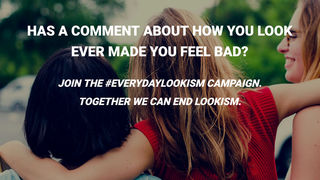Bias
Join the #EverydayLookism Campaign
It's time to kick back against body shaming.
Posted November 5, 2019
Have you ever felt ashamed of your body? Have you been hurt when someone made a nasty comment about your looks? Have you been told that you are too fat or too thin? That you are wearing too much makeup or not enough? That your bum isn’t big enough? That your nose is too big or your lips not big enough? That your face or body is too hairy? That you are too dark or too pale? That you care too much about how you look, or that you don’t care enough? That you ‘should make an effort’ and ‘not let yourself go’?
Negative comments about appearance are part of our everyday experience. They are so normal that they happen all the time. They happen in the playground, at the coffee machine, in the changing room, on a night out. They happen to celebrities and those in the public eye. How often does a celebrity get called out for having work done or not having work done? For showing cellulite or underarm hair? We have TV programs and social media devoted to body failures and botched surgery. We also have programs that tell us how to fix your bodily flaws and offer us surgery. In our private lives, we have to be camera-ready and present our ‘best selfie’. If we don’t get it right we are fair game.
But why? We don’t think it’s ok to make other comments which cut so deep. We think it’s cruel and wrong. These comments shouldn’t be normal, we should not put up with them. We need to recognize lookism as unfair, to call out this body-shaming behavior and make it unacceptable. Just because it happens all the time it doesn’t mean we have to accept it.

#everydaylookism seeks to change this, to call out lookism. To give us the words to recognize lookism when we see it, and to give us a way to challenge it. Negative comments about bodies are not trivial or ‘a bit of fun’ they hurt and they hurt deeply. The #everydaylookism stories we’ve already received show they can stay with us and define how we feel for decades. This is just one example:
“When I was 21 I went to my university ball (my first time for this kind of event). I was all dressed up for the first time, walking to meet some friends, and a van full of men drove past. They rolled down the window and shouted, "Hey ugly, you look like a man". That was over 20 years ago and it still rings in my ears every day.”
These comments can shape who we are and what we feel we can do.
The #everydaylookism campaign aims to show just how important lookism is, and to give us a way to fight back. Sharing stories of sexism proved powerful and empowering in the #everydaysexism campaign. Sharing stories of lookism can give us the resources we need to challenge lookism. It was not that long ago we didn’t have words for sexism. It was ok – even complementary – for bums to be pinched or sexist comments made. In the 1960s world of MadMen calling out sexism was hard. It's much easier now we can name it. Very recently #metoo has called out all kinds of sexist and exploitative behavior.
The hundreds of #everydaylookismstories which have already been shared show that it doesn’t matter what you do. We can all be body-shamed, and for virtually anything. It is literally impossible to get it right. Examples from the stories we’ve already received are:
“You look so skinny, like not in a good way. You can see your ribs.”
“You would be so attractive if you lost some weight.”
“Are you ok? You look ill without make-up.”
“Girls who wear make-up are fake.”
Lookism is not the same as sexism, for a start, everyone can experience lookism, irrespective of gender or sexuality. (Although in general we still focus more on women’s bodies than men’s.) But like sexism lookism is unfair; a form of discrimination. Because we haven’t named it yet lookism is almost invisible, often seen as just a normal part of everyday life, something we have no choice but to put up with. No matter how uncomfortable it makes us feel or how self-conscious and vulnerable. It doesn’t have to be normal and we don’t have to put up with it. Naming it, sharing our experiences, and refusing to accept it is the first step in changing our culture.
In a visual and virtual culture, where our bodies are ourselves, body shaming is people shaming. We have an epidemic of body image anxiety which is debilitating and devastating. One way to begin to address this is to say it’s never ok to make negative comments on other people’s bodies. This would change the mood music and make us less self-conscious. It doesn’t matter what the intention is, the risk is too high. By sharing our stories we can show just how prevalent lookism is. Together we can show that it really doesn’t matter what you do or don’t do, you can be body shamed. The stories we have received so far are powerful. Some stories are intended to hurt and are downright cruel. They aim to bully, to beat down, to undermine:
“Look at that moving mountain”
“Why are you surprised? You're single because you're ugly and fat. No one will ever want you!”
“I can't work out if she looks more like a witch or like Hagrid.”
“You have a monobrow and it's disgusting.”
“Don’t invite her, she will eat all of the food at the buffet.”
Other’s aren’t intended to hurt – and at least might be considered well-meaning. But they still hurt:
“When I was 10 years old, my mom said I was getting too fat, so limited me to eating one chapati with my dinner a night. When I bring this up now, she says 'You should thank me, I was only looking out for you.'”
“When I was in Year 8, two girls at school invited me to their house. Then they told me it was for a makeover because I really needed one.”
"'You should get out more, you're way too pale. You look like a milk bottle.' — My father tells me this every summer when I wear shorts."
"'Put some makeup on so it looks like you've made an effort.' — From my Grandma."
It doesn’t matter what it is or who it’s from, we should stop all negative and shaming comments. We ask you to help us, to share your story, to join your voice to others. We know body-shaming is everywhere, but that doesn’t mean it should be - we also know it hurts. We know comments can come from those we love, or from those who have power over us for example, bosses or colleagues. We know these can’t be shared in our own names. For this reason, we are sharing stories anonymously as well as using the hashtag. Join the campaign and read other stories at everydaylookism.bham.ac.uk. Show your support on social media using #everydaylookism.
Let's share it today, and stop it tomorrow.
If we put our stories together and share the campaign we can make a difference. By cataloguing our experiences of lookism we can call it out, say it matters, and it needs to stop. Together our stories have power. Don’t feel bad, kick back against body shaming.




